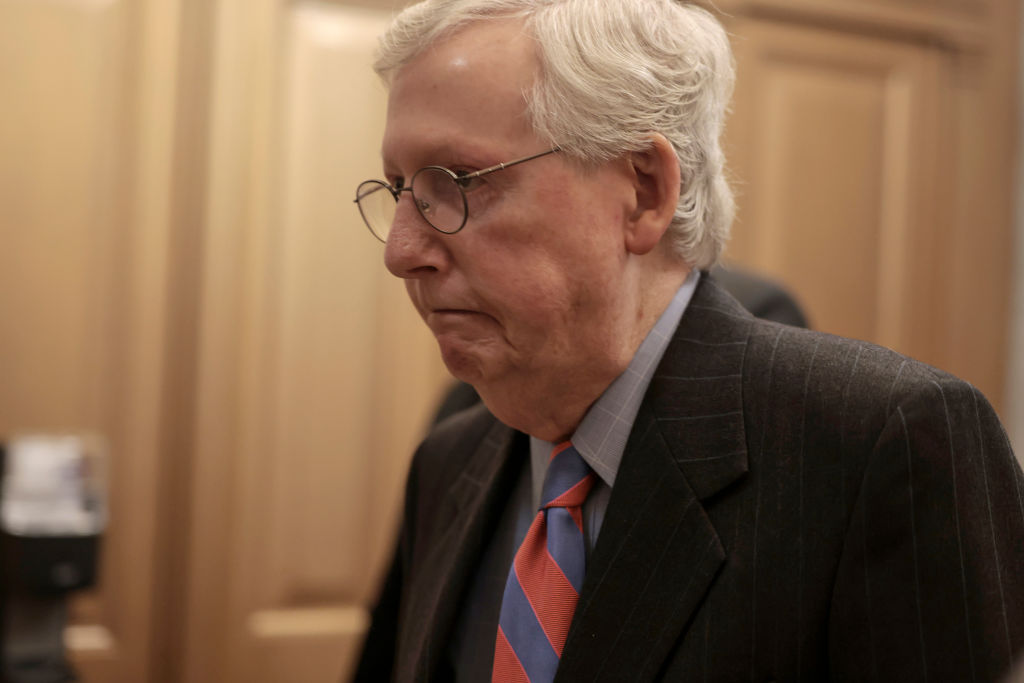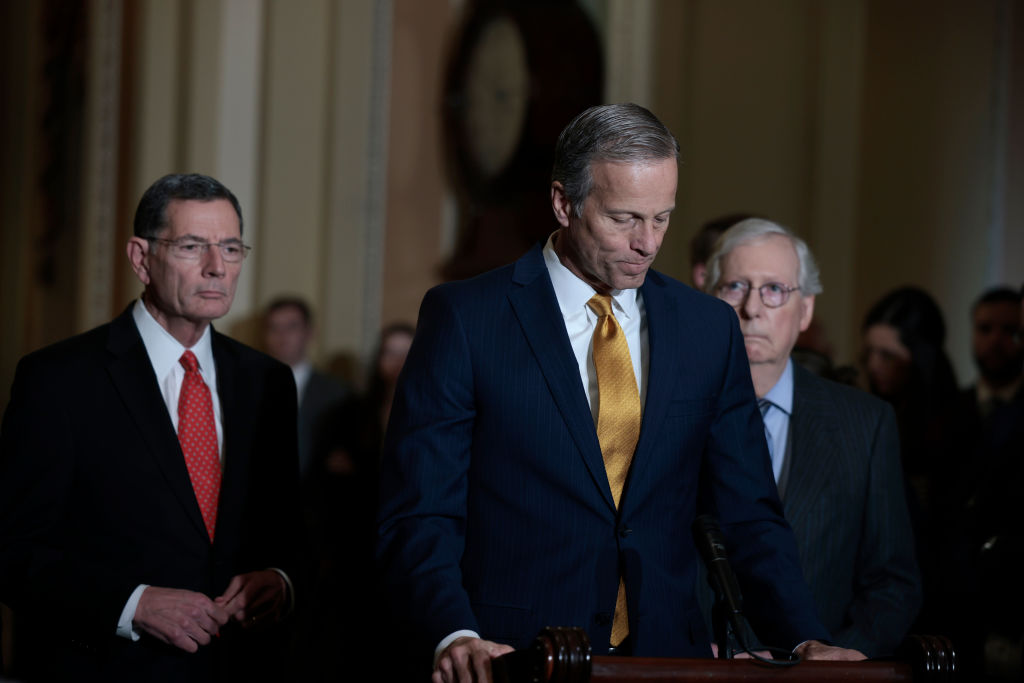A new type of deal brokered in the U.S. Senate could have long-reaching implications for the future of the filibuster. Thanks to dealings between upper chamber party leaders, a number of GOP lawmakers voted with Democrats to pass a resolution that would allow a simple majority vote on increasing the debt limit. Casting votes on an otherwise unrelated bill, 14 Republicans joined their opposition colleagues to provide the majority party with an opportunity to cover government costs without the ever-present threat of filibuster action. This “one-time” rule change could have consequences that reverberate far beyond this year’s debt cap debate.
An Early Christmas for the Democrats
 After Senate Minority Leader Mitch McConnell (R-KY) offered Senate Majority Leader Chuck Schumer (D-NY) a deal to end the debt limit debate, the Protecting Medicare and American Farmers from Sequester Cuts Act was amended to include a section allowing for a single vote on a debt limit resolution in the Senate. Merely a simple majority is needed to clear it, with no filibuster, no motion to reconsider, and no points of order allowed. Far more so even than the House procedures, this rule change truly does fast track the coming resolution through the Senate – and with the dollar amount left empty, it’s essentially a blank check.
After Senate Minority Leader Mitch McConnell (R-KY) offered Senate Majority Leader Chuck Schumer (D-NY) a deal to end the debt limit debate, the Protecting Medicare and American Farmers from Sequester Cuts Act was amended to include a section allowing for a single vote on a debt limit resolution in the Senate. Merely a simple majority is needed to clear it, with no filibuster, no motion to reconsider, and no points of order allowed. Far more so even than the House procedures, this rule change truly does fast track the coming resolution through the Senate – and with the dollar amount left empty, it’s essentially a blank check.
The measure cleared the House easily, but without any Republican supporters beyond Adam Kinzinger of Illinois, a representative who seemed to hate Donald Trump almost as rabidly as anyone on the left, has been voting like a Democrat anyway of late, and really has nothing to lose since he isn’t seeking re-election. The vote was a party-line 222-212. The bill blocks an automatic cut in Medicare spending that would otherwise trigger in January, so it was already popular amongst Democrats. Add in a section that gives them complete control over the debt limit, and it was never in question that it would pass the House.
The Senate, however, seemed less sure. The amendment needed 60 votes to overcome the filibuster, and it faced fierce opposition in the GOP. That said, it makes sense Schumer wouldn’t have called the vote if he didn’t think his Republican counterpart could muster the support – and McConnell probably would never have offered if he didn’t. The final vote Thursday night was 59-35 – eight more than needed to pass the bill after the 64-36 cloture vote earlier in the day. Every Democrat in the Senate voted “aye” both times, but these are the 14 Republicans who killed the filibuster:
- John Thune – South Dakota
- Mitch McConnell – Kentucky
- John Barrasso – Wyoming
- Roger Wicker – Mississippi
- Shelley Moore Capito – West Virginia
- Susan Collins – Maine
- Roy Blunt – Missouri
- Thom Tillis – North Carolina
- Lisa Murkowski – Alaska
- Richard Burr – North Carolina
- John Cornyn – Texas
- Joni Ernst – Iowa
- Mitt Romney – Utah
- Rob Portman – Ohio
The Will of the People?
Is this uniparty politics at its worst? Are some of these lawmakers Republicans in Name Only (RINOs)? Do they fear the left’s narrative that if the debt limit is hit, the GOP – not the Democrats who refuse to balance the budget – will take the blame? Are there some sweet deals to come later as payment for services rendered with this vote? Did they simply decide that passing the Medicare bill was worth sacrificing any remaining power over the debt limit debate?
 Whatever their individual reasons, 14 Senate Republicans joined the Democrats to destroy the last remnants of any leverage the party held over the debt limit. Doing so invoked the wrath of the former president – and, presumably, the base that elected him – hardly a change for the handful of anti-Trumpers on that list. As for accountability, only a couple must answer to those voters any time soon. Of the 14, six just started terms and have until 2026 before they must face the electorate again, three are safe until 2024, and three have terms ending this go around but have already announced they aren’t running. That leaves two.
Whatever their individual reasons, 14 Senate Republicans joined the Democrats to destroy the last remnants of any leverage the party held over the debt limit. Doing so invoked the wrath of the former president – and, presumably, the base that elected him – hardly a change for the handful of anti-Trumpers on that list. As for accountability, only a couple must answer to those voters any time soon. Of the 14, six just started terms and have until 2026 before they must face the electorate again, three are safe until 2024, and three have terms ending this go around but have already announced they aren’t running. That leaves two.
John Thune of South Dakota will likely face questions about his voting record of late during his run for re-election in 2022 – but only if he doesn’t bow out. Back in October, he expressed doubt over whether he really wanted to follow through with the campaign. If he does choose not to participate in the midterms, he has nothing at all to fear from voting however he wants.
Alaska’s Lisa Murkowski is also up in the 2022 election – and she absolutely is running. This long-time anti-Trumper has a habit of voting with the Democrats on certain issues, and she even voted to convict the former president in his impeachment trial. She faces stiff competition from a Trump-backed primary challenger, but she’s all in on the fight and doesn’t plan on going anywhere. She, more than anyone on this list, puts her career at risk by voting as she did – but it certainly isn’t out of character for her.
Far-Reaching Consequences

Sen. Mitch McConnell (R-KY) (Photo by Anna Moneymaker/Getty Images)
What are the immediate consequences of this vote? In the next week or so, Democrats will draft and then pass a resolution through both chambers of Congress without any need for GOP support. That increase is expected by some to be as high as $2 trillion or more, allowing the debt limit issue to be taken off the floor until the end of next year, past the midterms. Or it could give just enough wiggle room to borrow the funds needed to implement the Build Back Better agenda, should it become law – which is now considerably more likely to happen sooner rather than later, as fast-tracking the debt limit issue means fewer delays.
Friday, Dec. 10 is the last day either the House or the Senate are scheduled to meet this year, but ultimately the legislative work isn’t done until Senate Majority Leader Schumer and Speaker of the House Nancy Pelosi (D-CA) say it is. As it stands, the plan is for Congress to return next week to work on the debt limit. Depending on how quickly that progresses through the Senate, it’s still possible the Build Back Better Act could clear the reconciliation process by Christmas – assuming Sen. Joe Manchin (D-WV) can be convinced, of course.
But this vote could reach far beyond the year 2021. As Sen. James Lankford (R-OK) pointed out, now that there’s a precedent for the House making a rule change for the Senate and burying it in another bill, what’s to stop them from setting up another “one-time” filibuster-proof vote by slipping it in a 900-page defense bill later on? To stop it, Republicans would have to know it’s there. And he’s confident now that this method exists and has been used once, it’ll be used again in the future.
Is it paranoid to say this could be the practical end of the filibuster? Consider the words of Sen. Elizabeth Warren (D-MA), who now wants more exemptions on issues like voting rights legislation. “This is an exception to the filibuster. And the Republicans have just signed on,” she said. “It’s proof that it’s possible to create exceptions to the filibuster and move forward when it’s important. Do it once, let’s do it twice.”
A gift that keeps on giving, as Sen. Warren sees it. A very merry Christmas to the Democrats indeed, courtesy 14 Senate Republicans.
~ Read more from James Fite.




